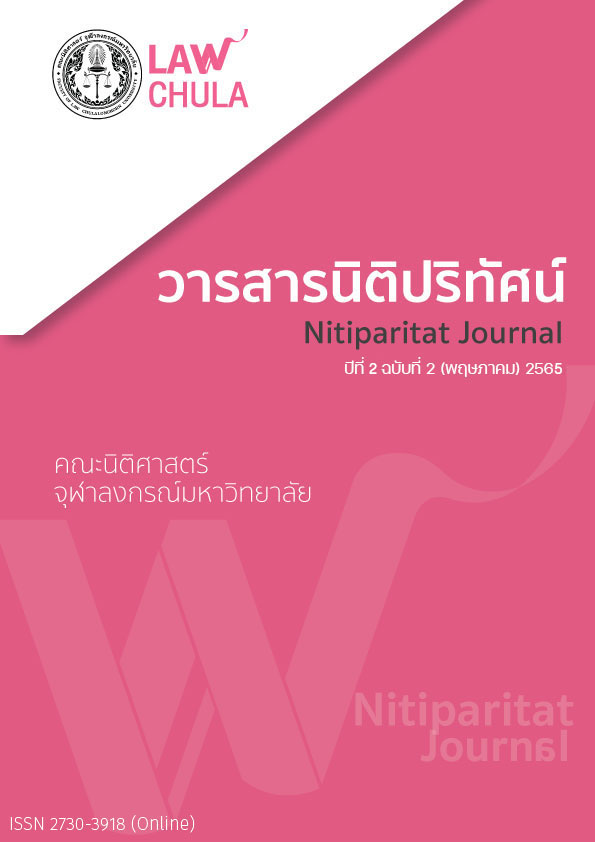สิทธิในการรับมรดกของบิดามารดาที่ไม่ได้เลี้ยงดูบุตร
บทคัดย่อ
การวิจัยครั้งนี้มีวัตถุประสงค์เพื่อเปรียบเทียบสิทธิในการรับมรดกของบิดามารดาที่ไม่ได้เลี้ยงดูบุตรเนื่องจากในสมัยอดีตค่านิยมที่ว่าบุตรเป็นสมบัติของบิดามารดานั้นปรากฏขึ้นในสังคมไทย ขณะที่ในปัจจุบัน ปัญหาการทอดทิ้งบุตร การทำร้ายร่างกายและจิตใจของบุตร รวมถึงการแสวงหาผลประโยชน์จากบุตรเป็นสิ่งที่ปรากฏให้เห็นตามสื่อต่าง ๆ อยู่เสมอ ทั้งในรูปแบบของข่าวอาชญากรรมและรูปแบบของการทำให้การกระทำเหล่านี้เป็นเรื่องน่าซาบซึ้งใจหรือเย้ายวนใจผ่านสื่อบันเทิง แต่ปัญหาเรื่องการเลี้ยงดูบุตรที่เกิดขึ้นก็ไม่ได้ถูกกล่าวถึงในเชิงโครงสร้างของสังคมเป็นวงกว้าง
เป้าหมายที่จะนำมาเปรียบเทียบในการวิจัยนั้นได้แก่สิทธิในการรับมรดกของบิดามารดาที่ไม่ได้เลี้ยงดูบุตรในกฎหมายเกาหลี สิทธิในการรับมรดกของบิดามารดาที่ไม่ได้เลี้ยงดูบุตรในกฎหมายอาร์เจนตินา และสิทธิในการรับมรดกของบิดามารดาที่ไม่ได้เลี้ยงดูบุตรในกฎหมายฝรั่งเศส การเปรียบเทียบนั้นจะเปรียบเทียบโดยการวิเคราะห์จากพื้นเพของสถาบันครอบครัวและประวัติศาสตร์ที่เกี่ยวข้องจากนั้นจึงไปพิจารณาที่ตัวบทกฎหมายของแต่ละประเทศ
ผลการวิจัยพบว่า
1.สิทธิในการรับมรดกของบิดามารดาที่ทอดทิ้งบุตรนั้นแตกต่างกันไปในแต่ละประเทศ เนื่องจากบทบัญญัติที่เกี่ยวข้องกับเรื่องดังกล่าวนั้นมีลักษณะการบัญญัติที่มีทั้งจุดที่เหมือนและต่างกันแปรผันตามพื้นฐานวัฒนธรรมของแต่ละประเทศ ดังนั้นจึงไม่สามารถบอกได้ว่ากฎหมายประเทศไหนดีที่สุด
2.กฎหมายไทยนั้นมีลักษณะที่เคารพเจตนาของเจ้ามรดกที่แสดงผ่านพินัยกรรมค่อนข้างมาก เนื่องจากเจ้ามรดกสามารถทำการตัดสิทธิบุคคลที่เป็นทายาทโดยธรรมในการรับมรดกของตนผ่านการทำพินัยกรรมได้โดยไม่มีเงื่อนไข
3.กฎหมายเกาหลีและฝรั่งเศสนั้น มีความเหมือนกันตรงที่กฎหมายของทั้งสองประเทศมีการบัญญัติที่มีลักษณะเป็นการจำกัดสิทธิในการทำพินัยกรรมของเจ้ามรดกเนื่องจากเจ้ามรดกไม่สามารถเขียนเนื้อหาในพินัยกรรมได้ตามใจชอบ
4.กฎหมายอาร์เจนตินานั้นมีลักษณะที่ให้ความสำคัญกับสิทธิในการรับมรดกของบิดามารดาในฐานะทายาทโดยธรรมค่อนข้างมากเนื่องจากมีการจำกัดสิทธิในการทำพินัยกรรมโดยกำหนดให้บิดามารดาเป็นทายาทบังคับ (Forced Heir)
เอกสารอ้างอิง
Snowblack, ‘บทสรุปมรดกไอดอลสาว ศาลครอบครัวกวางจูตัดสิน แม่คูฮารา ได้ส่วนแบ่ง 40%’ (แพรว, 23 ธันวาคม 2563) <https://praew.com/people/asian-people/357503.html> สืบค้นเมื่อ 9 พฤศจิกายน 2564.
ศิริรัตน์ คุปติวุฒิ, ‘การสร้างครอบครัวใหม่’ (Siriraj E-Public Library, 8 ตุลาคม 2553) <https://www.si.mahidol.ac.th/sidoctor/e-pl/articledetail.asp?id=278> สืบค้นเมื่อ 13 พฤศจิกายน 2564.
ภัทริดา สุคุณณี, ‘บทวิเคราะห์รัฐธรรมนูญ เรื่อง สิทธิเด็ก เยาวชน และบุคคลในครอบครัว’ (รายงานส่วนบุคคล กลุ่มงานพัฒนากฎหมาย สำนักกฎหมาย) 11 <https://www.parliament.go.th/ewtadmin/ewt/elaw_parcy/ewt_dl_link.php?nid=156> สืบค้นเมื่อ 12 พฤศจิกายน 2564.
‘Thai Culture’ (Cultural Atlas) <https://culturalatlas.sbs.com.au/thai-culture/thai-culture-references#thai-culture-references> สืบค้นเมื่อ 20 ตุลาคม 2564.
ไพโรจน์ กัมพูสิริ, หลักกฎหมายมรดก, พิมพ์ครั้งที่ 5 (แก้ไขเพิ่มเติม), (กรุงเทพฯ : โครงการตำราและเอกสารประกอบการสอน คณะนิติศาสตร์ มหาวิทยาลัยธรรมศาสตร์) หน้า 13 - 14
เรื่องเดียวกัน, หน้า 25 – 26.
คู่สมรสเป็นทายาทโดยธรรมประเภทพิเศษที่ไม่มีเลขลำดับและไม่อาศัยหลักญาติสนิทตัดญาติห่างในการกำหนดสิทธิรับมรดกเหมือนอย่างทายาทโดยธรรมทั้งหกลำดับ เนื่องจากมาตรา 1629 วรรคท้าย กำหนดให้คู่สมรสมีสิทธิและส่วนแบ่งตามบทบัญญัติแห่งมาตรา 1635
ผู้สืบสันดาน หมายถึง ผู้ที่สืบสายโลหิตโดยตรงลงมาทุกชั้นของเจ้ามรดก ได้แก่ บุตร หลาน เหลน ลื่อ และต่อจากลื้อลงไปจนกว่าจะขาดสาย
ไพโรจน์ กัมพูสิริ, เรื่องเดิม, หน้า 26 – 27.
เรื่องเดียวกัน.
พรชัย สุนทรพันธุ์, คําอธิบายกฎหมายลักษณะมรดก (สํานักอบรมศึกษากฎหมายแห่งเนติบัณฑิตยสภา 2551) 127. อ้างถึงใน กานต์สินี ทิพย์มณเทียร และชัช
วรรณ์ ลีโรจนวุฒิกุล, ‘สิทธิของบิดามารดาในการรับมรดกของบุตร’ (2562) 3 วารสารมหาวิทยาลัยราชภัฏรอยเอ็ด 230 <https://so03.tci-thaijo.org/index.php/reru/article/view/190049> สืบค้นเมื่อ 20 ตุลาคม 2564.
ดาวน์โหลด
เผยแพร่แล้ว
รูปแบบการอ้างอิง
ฉบับ
ประเภทบทความ
สัญญาอนุญาต
ลิขสิทธิ์ (c) 2022 พ็ญพิชชา วรวรรณ ณ อยุธยา, ธนพัต ขจรชัยกุล, สรสิช ปรัชญสุนทร, หนึ่งฤทัย กิจการศุภฤกษ์

อนุญาตภายใต้เงื่อนไข Creative Commons Attribution-NonCommercial-NoDerivatives 4.0 International License.
บทความที่เสนอเพื่อพิจารณาการตีพิมพ์ต้องไม่มีลักษณะคัดลอกผลงานวิชาการและต้องไม่มีเนื้อหาที่ละเมิดลิขสิทธิ์



